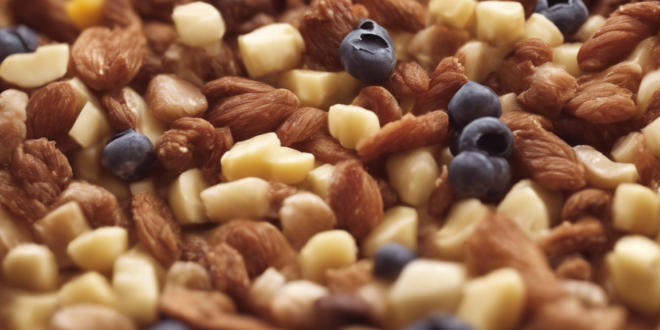Revolutionize Your Diet: Why Fiber Matters More Than Protein, According to Nutrition Experts
In the ever-evolving world of nutrition science, one crucial element often gets overlooked while everyone obsesses over protein intake. Top nutrition expert Tim Spector is challenging conventional dietary wisdom, revealing why fiber might be the real hero of a healthy diet that most Americans are missing.
The Fiber Revolution: What Most People Don’t Know
For years, fitness enthusiasts and health-conscious individuals have fixated on protein as the ultimate nutritional goal. Protein shakes, protein bars, and high-protein diets have dominated nutrition conversations. However, leading nutritional scientists like Tim Spector are sounding the alarm: we’ve been focusing on the wrong macronutrient.
Why Fiber is the Unsung Hero of Nutrition
Fiber is more than just a digestive aid – it’s a complex nutritional powerhouse that plays a critical role in overall health. Unlike protein, which receives endless attention, fiber works silently to improve multiple aspects of human health. Research shows that adequate fiber intake can:
• Reduce inflammation
• Support gut microbiome health
• Lower cholesterol levels
• Improve blood sugar regulation
• Enhance weight management
• Decrease risk of chronic diseases
The Shocking Fiber Deficiency in American Diets
Most Americans consume significantly less fiber than recommended. The average daily intake is approximately 15 grams, while nutritional experts recommend 25-35 grams per day. This substantial gap means millions are missing out on critical health benefits.
Understanding Fiber: Beyond Simple Nutrition
Fiber isn’t just one thing – it’s a complex group of plant-based carbohydrates that the human body cannot digest. There are two primary types: soluble and insoluble fiber. Soluble fiber dissolves in water and can help lower blood glucose and cholesterol levels, while insoluble fiber aids digestion and prevents constipation.
Practical Strategies to Increase Fiber Intake
Implementing more fiber into your diet doesn’t have to be complicated. Here are expert-recommended approaches:
1. Gradually increase fiber consumption
2. Choose whole grains over refined options
3. Incorporate more legumes and beans
4. Eat a variety of fruits and vegetables
5. Consider fiber supplements if needed
Plant-Based Protein: A Fiber-Rich Alternative
Interestingly, many plant-based protein sources are naturally high in fiber. Foods like lentils, chickpeas, quinoa, and black beans provide both protein and fiber, offering a nutritional double benefit. By shifting towards these foods, individuals can simultaneously meet protein goals and increase fiber intake.
The Gut Health Connection
Emerging research demonstrates a profound link between fiber, gut microbiome, and overall health. Fiber serves as a prebiotic, feeding beneficial bacteria in the digestive system. A healthy gut microbiome is associated with improved immune function, mental health, and metabolic processes.
Debunking Common Fiber Myths
Many misconceptions surround fiber intake. Some believe fiber supplements are equivalent to whole food sources, while others think fiber is only important for digestive health. Scientific evidence suggests fiber’s benefits are far more comprehensive and nuanced.
Potential Health Risks of Low Fiber Consumption
Consistently low fiber intake can contribute to numerous health complications:
• Increased cardiovascular disease risk
• Higher likelihood of developing type 2 diabetes
• Compromised digestive system functionality
• Potential weight management challenges
• Reduced immune system effectiveness
Implementing a Fiber-Rich Diet: Practical Tips
Transitioning to a high-fiber diet requires strategic planning. Start by:
• Reading nutrition labels
• Experimenting with new plant-based recipes
• Gradually introducing fiber-rich foods
• Staying hydrated
• Monitoring your body’s response
Consulting Healthcare Professionals
While general dietary guidelines provide valuable insights, individual nutritional needs vary. Consulting a registered dietitian or nutritionist can help develop a personalized fiber strategy tailored to your specific health goals and requirements.
Conclusion: A Fiber-Focused Future
As nutrition science continues advancing, the importance of fiber becomes increasingly clear. By shifting focus from protein-centric approaches to a more holistic view of nutrition, individuals can unlock significant health potential.
The message is simple: don’t just count your protein – prioritize your fiber. Your body will thank you.
 Good Calories Guide GoodCalories Guide focuses on nutrition, healthy eating, and overall wellness. The site offers practical insights into evidence-based dietary practices, including tips for specific lifestyles such as veganism, keto, and family-friendly meal planning. It also addresses unique nutritional needs for individuals with conditions like diabetes or food allergies, while providing quick and accessible recipes to make healthy living a sustainable and enjoyable choice.
Good Calories Guide GoodCalories Guide focuses on nutrition, healthy eating, and overall wellness. The site offers practical insights into evidence-based dietary practices, including tips for specific lifestyles such as veganism, keto, and family-friendly meal planning. It also addresses unique nutritional needs for individuals with conditions like diabetes or food allergies, while providing quick and accessible recipes to make healthy living a sustainable and enjoyable choice.


